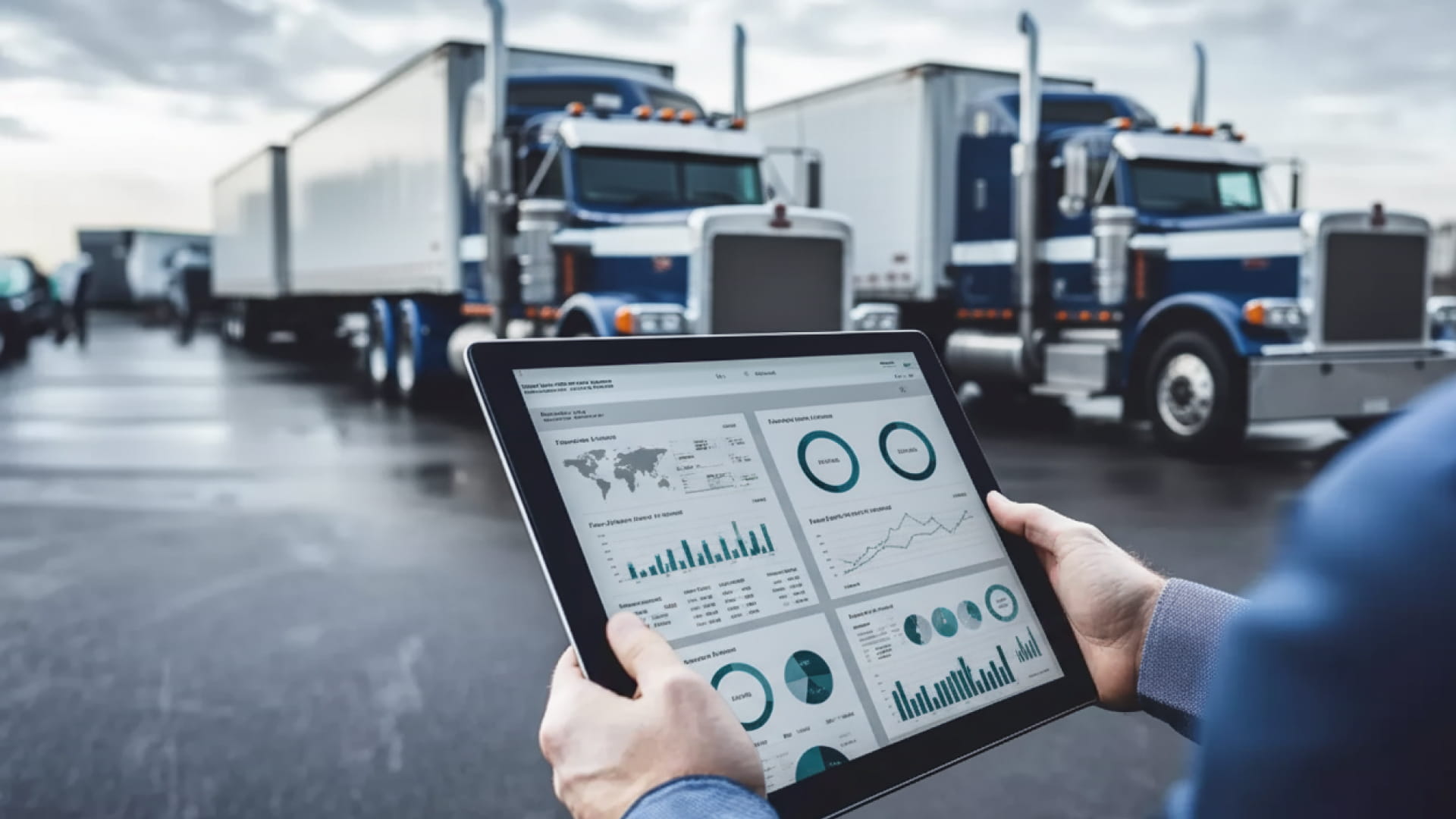The freight brokerage sector has long been synonymous with manual processes, inefficiency, and time-consuming administrative tasks. But that has changed. Artificial Intelligence (AI) and Machine Learning (ML) are at the forefront of this transformation, redefining how brokers manage operations, interact with clients, and streamline logistics. These technologies allow freight brokers to match shipments with carriers faster, track shipments more efficiently, predict demand, optimize pricing models, and make smarter business decisions. Let’s dive deeper into how AI and ML are making waves in freight brokerage services.
Optimizing Freight Matching with AI
Traditionally, freight brokers relied heavily on human input to match shipments with available carriers. This often led to inefficiencies and errors, as brokers manually matched loads based on limited data, sometimes missing out on better options.
With AI, this process has become far more automated and accurate. AI algorithms can analyze a vast amount of real-time data-such as truck availability, load size, route conditions, weather forecasts, and more-providing an optimized match in seconds. This is a far cry from the slow, cumbersome manual process.
- Real-Time Freight Matching: AI not only optimizes carrier-load matching but also keeps track of external variables (like weather or traffic) that can impact delivery. For example, if a route is congested or affected by weather conditions, AI can automatically adjust the route to ensure on-time delivery.
- Predictive Analysis for Future Loads: ML algorithms improve over time by learning from past data, predicting the availability of trucks, the most efficient routes, and even potential delays.
- Benefits: Faster matches, improved load planning, reduced empty miles (which lowers fuel consumption), and better utilization of truck capacity.
The real-time optimization and predictive capabilities of AI make freight matching faster, more accurate, and more efficient, reducing overhead costs and improving service reliability.
Enhancing Shipment Tracking with Real-Time Data
Tracking shipments is a core function of any freight brokerage operation, but traditional tracking systems were often manual and inefficient. The introduction of AI-powered shipment tracking systems has turned this on its head, offering freight brokers, carriers, and customers access to real-time, actionable data.
- Automated Tracking Systems: AI-driven systems integrate GPS, traffic data, and weather forecasts to provide up -to-the-minute information about shipment status. This includes estimated delivery times, potential delays, and up-to-date route optimization.
- Predictive Delays: Machine Learning models can identify potential delays before they occur by analyzing past trends. If a certain route is prone to traffic jams, for instance, the system can alert the broker, offering them a chance to take proactive measures.
- Customer Transparency: Customers now expect to know exactly where their shipments are at any given moment. With AI, brokers can provide this real-time tracking to customers through easy-to-use apps and portals, creating a more transparent and trust-driven relationship.
- Benefits:
- Greater transparency and better communication.
- Proactive problem-solving for delays.
- Improved efficiency and reduced anxiety for customers.
By leveraging real-time data and predictive analytics, AI significantly enhances the visibility and reliability of freight shipments, giving brokers more control and improving the customer experience.
Improving decision-making with AI and ML
For freight brokers, decision-making used to be a subjective process. Prices were determined manually, routes were decided based on experience, and forecasts were based on limited historical data. Now, AI and ML provide data-driven insights that drastically improve decision-making.
- Data-Driven Insights: AI analyzes historical data, market trends, and operational data to provide actionable insights. These insights guide brokers in choosing the best routes, adjusting pricing dynamically, and predicting freight demand. For instance, brokers can predict peak shipping seasons and adjust capacity accordingly.
- Demand Forecasting: Machine learning allows brokers to predict demand with greater accuracy. By analyzing patterns in past shipments, brokers can forecast when and where additional capacity will be needed, giving them the ability to adjust resources proactively.
- Dynamic Pricing Models: AI allows for the development of dynamic pricing systems that adjust in real time based on demand, capacity, fuel prices, weather conditions, and even competitor rates. This enables brokers to optimize pricing to maximize profits during peak times without alienating customers.
- Benefits:
- More accurate pricing models and better resource planning.
- Reduction in pricing errors and human bias.
- More reliable decision-making based on actual data.
AI and ML are bringing greater precision to decision-making, reducing errors, and improving profitability for freight brokers.
ELD Devices for ELD Trucking and Their Role in Freight Brokerage
Electronic Logging Devices (ELDs) are now a staple in the trucking industry, ensuring compliance with federal regulations regarding Hours of Service (HOS). However, their role extends beyond just compliance.
- AI-Powered ELD Devices: Modern ELD devices are becoming more sophisticated with AI and ML integration. They not only track driver hours but also monitor factors like driver behavior, vehicle maintenance, and driving efficiency.
- Predictive Maintenance: ELDs powered by AI can predict when a truck is likely to need maintenance, alerting fleet managers before a breakdown happens. This reduces downtime and prevents costly repairs.
- Improved Fleet Management: With real-time data about drivers’ behaviors, such as speeding or harsh braking, AI helps brokers make data-driven decisions about fleet operations, ensuring both compliance and safety.
- Benefits:
- Compliance with HOS regulations.
- Enhanced fleet performance and reduced downtime.
- Improved driver safety and efficiency.
As AI and ML continue to enhance ELD devices, brokers can ensure that their fleets operate more smoothly, while also improving safety, regulatory compliance, and cost-effectiveness.
Cost Savings and Operational Efficiency
AI and ML deliver substantial cost savings and operational improvements across the freight brokerage process. By automating tasks, optimizing routes, and reducing inefficiencies, brokers are seeing lower operating costs.
- Route Optimization: AI-powered systems ensure that trucks are always on the most efficient route, which reduces fuel consumption and delivery times.
- Reduced Human Error: AI minimizes the need for human intervention, which lowers the risk of costly mistakes, such as misdirected shipments or missed deadlines.
- Automation of Routine Tasks: From paperwork to invoicing, AI automates tedious tasks, allowing brokers to focus on higher-value activities.
- Benefits:
- Reduced operational costs.
- Faster operations and quicker deliveries.
- More efficient resource management.
With AI and ML, freight brokers can streamline operations, reduce costs, and allocate resources more effectively, creating a more profitable and scalable business.
Customer Experience Improvements
AI and ML are making a massive difference in the customer experience, ensuring that freight brokers offer fast, responsive, and reliable services.
- Real-Time Communication: With AI-driven platforms, brokers can provide their customers with accurate, real-time updates on the status of their shipments. Customers appreciate the transparency and instant access to information.
- Proactive Customer Support: ML can predict issues before they happen, allowing brokers to offer proactive solutions. Whether it’s adjusting a route due to weather or informing a client of a potential delay, AI helps brokers maintain customer satisfaction.
- Faster Response Times: Chatbots and AI-driven customer service platforms can handle routine queries quickly and efficiently, providing customers with faster support.
- Benefits:
- Improved customer satisfaction.
- Increased loyalty through proactive communication.
- More efficient customer support.
By integrating AI into customer-facing operations, brokers can provide a superior customer experience that enhances retention and builds trust.
The Future of Freight Brokerage with AI and ML
The future of freight brokerage is deeply intertwined with the growth of AI and machine learning. The industry is moving towards autonomous trucks, predictive analytics, and blockchain integration-each driven by AI.
- Autonomous Freight: AI-powered autonomous trucks are on the horizon, offering the potential for lower operational costs and faster delivery times. These trucks will revolutionize the way freight is transported, allowing brokers to operate more efficiently.
- Blockchain and AI Integration: Combining blockchain technology with AI will ensure more secure, transparent, and efficient transactions. Brokers will be able to securely track every step of the shipment process, from initial booking to final delivery.
- Machine Learning in Fleet Management: As machine learning advances, fleet management will become even more efficient, with AI predicting when vehicles need maintenance, optimizing driver schedules, and reducing fuel consumption.
- Benefits:
- Greater efficiency in freight operations.
- Improved safety with autonomous vehicles.
- Enhanced transparency in the supply chain.
The future of freight brokerage lies in the successful integration of AI and ML, setting the stage for a more efficient, transparent, and cost-effective logistics industry.
AI and machine learning are transforming the freight brokerage industry by improving efficiency, cutting costs, and providing real-time insights. As these technologies evolve, they will continue to drive innovation and optimization, making brokers faster, safer, and more customer-focused. Embracing AI and ML is crucial for staying competitive in the future.










